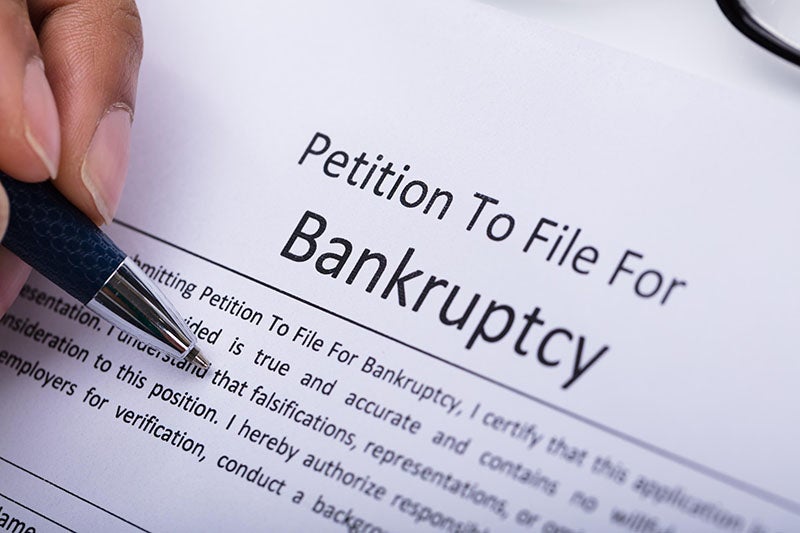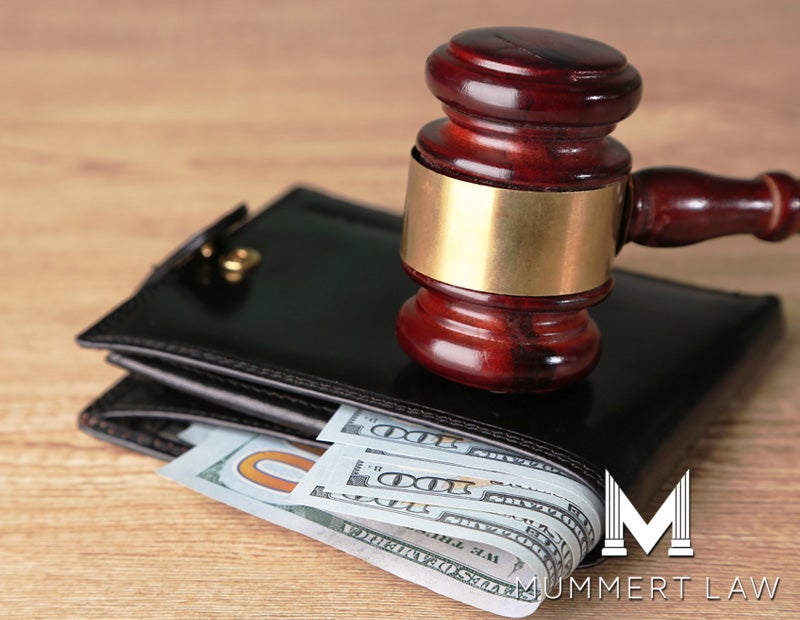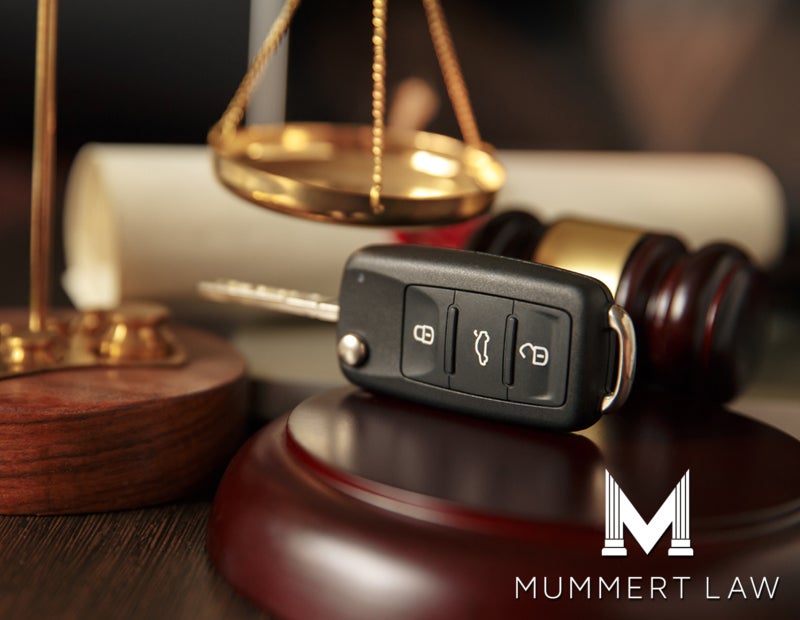-
Choosing The Right Bankruptcy Lawyer

Filing for bankruptcy can be distressing, emotional, and complex, and it can also be a time-consuming undertaking. Moving through the process of seeking debt and financial hardship relief can take months or years to accomplish. However, a knowledgeable bankruptcy lawyer can help make all the difference. Their understanding of the legalities can simplify the approach, give you peace of mind, and help you avoid problems throughout the process. But it’s vital to choose the right lawyer for you!
What Is Bankruptcy?
Bankruptcy helps debtors relieve financial stress and problems that they may face. Typically, consumers file for Chapter 7 or Chapter 13 bankruptcy, designed to give debtors a fresh start. On the other hand, businesses and organizations can file for Chapter 7 or Chapter 11 bankruptcy. Bankruptcy lawyers aim to assist individuals and companies throughout the filing process.
What Are Bankruptcy Lawyers?
Bankruptcy lawyers typically specialize in consumer or commercial bankruptcy. Both transactional and litigation affairs are involved with bankruptcy practices.
Benefits of Hiring a Bankruptcy Lawyer
A knowledgeable bankruptcy lawyer can significantly impact filing and your overall achievement of debt relief because they:
- Understand the legal process
- Can improve your chances of success
- May help you save money over time
- Provide you with peace of mind
- Can assist with avoiding problems throughout the process
- Can help you keep real estate or assets that you own
- Make a complicated process easier for you
However, picking the right attorney to experience the above benefits is vital.
Choosing the Right Bankruptcy Lawyer
How do you choose which attorney is best suited for your situation? You can begin by following these steps:
1. Look at reviews
Today’s consumers often rely on reviews before making any purchasing decision. So, as you seek a bankruptcy lawyer, consider reviewing reviews for attorneys in your area.
The AVVO rating evaluates an attorney’s background, reveals state bar association information, and showcases details about other legal professional organizations. You can utilize this as a research tool when looking for reviews.2. Ensure they have experience in business and financial matters
Finding a bankruptcy lawyer with extensive knowledge and a considerable background in bankruptcy law, business, and financial matters is critical. These attorneys will have an in-depth understanding of the bankruptcy process. They will be able to best assist you with providing reliable consultation. They’ll also be able to keep you on track throughout the proceeding.3. Participate in a consultation
Most law firms and attorneys provide free consultations. These meetings will allow you to ask questions and examine if you and their team are a good fit. This consultation may be your first chance to speak with the bankruptcy lawyer. You’ll be able to determine whether you believe they can help you and your family find relief. In addition, notice whether they discuss various alternative resolutions, as they should present the most beneficial way to overcome your financial situation.4. Take note of their passion or energy
A bankruptcy attorney who is passionate and focuses their energy on helping you find financial relief is critical to the positive achievement within your case. And don’t be hesitant to ask why they chose to specialize in financial or bankruptcy law. Consider looking for a connection with their purpose and why they aim to help you and your family.5. Make sure they take the time to listen and understand you and your situation.
Every bankruptcy case is unique. And walking through the process can be distressing and emotional. A lawyer who hears and understands you can help ensure you feel confident and secure throughout the filing process. In addition, you’ll have a great deal of contact with your lawyer. So, you must find one with whom you’re comfortable.The mere thought of filing for bankruptcy and finding a lawyer can be intimidating. We understand, and that’s why we’re here to help make your journey to achieving debt relief as easy as possible. At Mummert Law, we’re available for a consultation. At this time, we’ll sit down together, evaluate your position, and determine the best way to proceed. So don’t go it alone when it comes to bankruptcy. Make your appointment with Mummert Law today!
-
What is a Joint Trust?

Few people go into marriage expecting it to end in divorce, especially when you have kids. But more than half of first marriages end in divorce, and many divorcees marry for a second time.
Before you blend your families together, discussing what will happen when one or both of you pass away is essential. One way to ensure your desires are met when you die is to create a trust. A joint trust may be a solution, as it is a way to avoid probate and pass on assets to your beneficiaries.
A joint trust is a single trust created and funded that covers both spouses. The spouses are co-trustees, and the trust can include individual and joint property and assets.
How Does a Joint Trust Work?
With a joint trust, two people, usually spouses, become co-trustees to a single trust. When the first spouse dies, the surviving spouse is now the sole trustee and manager of the trust.
Once the remaining spouse passes away, the joint trust cannot be changed and is now an irrevocable trust. The designated successor trustee is now the manager of the trust. They are responsible for distributing the assets to the beneficiaries under the trust document instructions.
Who Should Have a Joint Trust?
There are benefits to a joint trust between spouses, but it isn’t a solution for every marriage.
In community property states, joint trusts are especially beneficial. Since both spouses own all property and assets acquired after marriage, a joint trust can make it easier to distribute assets upon death. Maryland is not a community property state, so this may not be as beneficial to Maryland residents entering a first or second marriage.
A joint trust is usually easier to maintain than two separate trusts and is more cost-effective. A joint revocable trust between spouses allows for asset and term changes while both are still alive.
Both spouses have equal control over the trust and the assets involved. You should only consider a joint trust if you expect this marriage to last until death. If you die first, your spouse is the sole owner of the trust. Logistically, dividing assets within a joint trust can be challenging if you divorce.
Who Shouldn’t Have a Joint Trust?
Both spouses must agree on any changes or adjustments within the joint trust. If you want to handle your assets differently than your spouse, a joint trust may not be for you.
If either of you expects a large amount of money at any point in the future, you may want to rethink a joint trust. It could affect the amount of estate tax due. If you improperly draft the trust, it could also disqualify you from the marital deduction.
If you or your spouse get sued or owe money to someone or an entity, like the IRS, a joint trust may not be in your best interest. Creditors can seize assets from a joint revocable trust, even if the debt is just for one spouse.
How Can I Create a Joint Trust?
Creating a properly executed joint trust is not easy. To ensure it’s enforceable and properly drafted, it’s best to hire an estate attorney. Schedule a consultation with Mummert Law to answer your trust questions, find out if a joint trust is right for you, and create one.
-
Separate Revocable Trusts

When you have children and have been through a divorce, it’s natural to be apprehensive about your kids’ future if you decide to marry again. A second marriage often requires much more planning than just a wedding when children are involved. This is especially true if you have assets you want to pass along to your children when you pass away.
If you were to pass away first and didn’t implement a plan, your children could unintentionally get disinherited. A trust may be a solution to ensure your share goes to your children from your first marriage.
What is a Revocable Living Trust?
A living trust, also called a revocable trust, is an account that holds the assets and funds you place in it throughout your lifetime. You can put your home, car, and other assets in the trust’s name.
While alive, you can add, remove or make changes to the trust as often as you like. Once you pass away, the trust becomes irrevocable, and no changes can be made. The designated trustee will then distribute the trust assets and funds per your instructions.
Should We Create a Joint Trust or Separate Revocable Trust?
If you and your second spouse want everything equal, a joint trust may be the right option. But if you want your children to receive your assets or you and your spouse have different ideas for allocation, two separate trusts are advisable. It’s also the best solution if you plan to keep your finances separate. If you have assets and property separately going into the marriage, you may wish to keep them in your family.
There are other benefits to having separate spouse trusts. If your spouse is in financial trouble and has creditors coming after them, having a separate trust can shield your assets from creditor access. In a joint trust, everything is up for grabs to pay for a debt if a creditor comes knocking.
Suppose you or your spouse expect to receive an individual inheritance you’d like to keep separate. In that case, a separate trust is the best choice. A joint trust makes the inheritance equally available to your spouse.
Perhaps the most practical reason to create a separate trust is for tax savings. Maryland has an estate and inheritance tax, often referred to as a death tax. Your heirs may have to pay estate and inheritance tax if your net worth exceeds Maryland’s exemption amount. However, separate spousal trusts allow you to double the tax exemption amount, which could reduce or even eliminate the amount of taxes they owe.
Ready to Set Up Your Separate Spouse Trusts?
Having children from a prior marriage can make finances tricky. If you think two separate spouse trusts are the way to go, are leaning towards a joint trust, or aren’t sure which is the best choice for your situation, contact Mummert Law to schedule a consultation. We can help you figure out which trust solution is best for your family and set them up correctly so there’s no chance of a dispute later.
-
Bankruptcy And Wage Garnishment
 Financial situations are unique, complicated, and can be overwhelming. Sometimes, if your debts go unpaid long enough, a creditor can garnish your wages. But what is wage garnishment? And can you still file for bankruptcy after your wages have been garnished?
Financial situations are unique, complicated, and can be overwhelming. Sometimes, if your debts go unpaid long enough, a creditor can garnish your wages. But what is wage garnishment? And can you still file for bankruptcy after your wages have been garnished?The short answer is that many people file Chapter 7 and Chapter 13 Bankruptcy to either stop or prevent a wage garnishment.
Wage Garnishment Defined
A creditor can sue you over unpaid debt. Typically, they’d need to obtain a money judgment against you, which is a court-issued document stating the creditor won the lawsuit. A money judgment is entered if you don’t respond to the initial suit, which is known as a default judgment, or after a trial and the Court rules in favor of the creditor. In Maryland, you have 10 days to pay the judgment. If you don’t pay the judgment, many creditors will then garnish 25% of your income from your wages, as well as attach your bank account or put a lien against your property.
Wage garnishment is when a creditor files a request to have your employer withhold or deduct part of your wages to begin paying back your debt. The types of debt that a creditor can collect through wage garnishment include:
- Credit card debt
- Personal loans
- Taxes
- Medical bills
Note – While you are allowed to oppose the garnishment, generally speaking, there is no defense in State Court of I cannot afford the garnishment. Also, this wage garnishment is not the same as attachment of your wages for unpaid child support or alimony.
Bankruptcy and Wage Garnishment
Filing for Chapter 7 or 13 Bankruptcy will stop your wage garnishment (except for child support or alimony). In addition, upon filing for bankruptcy, a court-ordered automatic stay stops the majority of civil lawsuits brought against you. It also eliminates most collection actions against your property.
What is an Automatic Stay?
An automatic stay briefly prevents collection agencies, creditors, government entities, and others from collecting on the money you owe them.The automatic stay will typically end at the close of the bankruptcy case, statutory code provision that automatically terminates the stay, or an order terminating the stay.
A creditor may request that the bankruptcy court lift the automatic stay, but this typically only happens if:
- The creditor has collateral-secured debt (e.g., a house or car)
- The creditor could lose money if they’re forced to wait until the completion of the case
- To allow a creditor to continue with a divorce or other domestic proceeding
Chapter 7, Chapter 13, and Wage Garnishment
Chapter 7 Bankruptcy
A stop will be put on your wage garnishment when you file for Chapter 7 Bankruptcy (otherwise known as wage attachment). If you successful complete the Chapter 7 and a discharge is entered against that debt, the creditor will not be able to garnish your wages anymore.Note – Child support, certain taxes, and student loan debts aren’t dischargeable through Chapter 7 Bankruptcy. You are also required to continue to pay your child support and alimony while in bankruptcy.
Chapter 13 Bankruptcy
When filing for Chapter 13 Bankruptcy, you’ll pay your creditors, including the ones garnishing your wages, through payment plans. At the end of the Chapter 13 case, the debt should be discharged and the creditor will not be able to have your employer withholding income to satisfy the debt.Note – As long as you’re complying with your Chapter 13 three-to-five-year repayment plan, your garnishments will stop. After that, however, the court can decree that the repayment plan be fulfilled by garnishing wages.
Wage Garnishment and How to File for Bankruptcy
At the Mummert Law Firm, we assist debtors in stopping wage garnishments. We will meet with you, discuss your financial circumstances, and propose the best course of action, inside and outside of bankruptcy.
If you elect to file bankruptcy, we will assist you in obtaining the information to prepare the Bankruptcy Petition, Schedules, and Statements (approximately a 50+ page documents). Once we file bankruptcy, we will notify the Court that entered the judgment and garnishment, the creditor seeking the garnishment, and your employer that an Automatic Stay has been entered on your behalf. Further, we will notify everyone that if they continue to collect the debt, that person could be subject to Contempt of Court for violating the Automatic Stay.
Finances are complicated, and you could be facing crushing debt and wage garnishment. Creditors can seek to collect on credit card debt, personal loans, taxes, and medical bills through your wages. But filing for bankruptcy can end your wage garnishment. However, don’t go it alone when it comes to finding financial relief. If you are facing wage garnishment, Mummert Law can help! We are available for a consultation, at which time we’ll sit down together, evaluate your position, and determine the best way to proceed. So make your appointment with Mummert Law today!
-
Medical Debt in Bankruptcy
 One of the foremost reasons individuals file for bankruptcy is because of medical debt. Why? Because planning your medical future can be difficult, if not impossible. Unexpected illnesses or other medical emergencies are a fact of life. Although we are grateful when we survive an emergency, we are often shocked by how much the medical issue costs.
One of the foremost reasons individuals file for bankruptcy is because of medical debt. Why? Because planning your medical future can be difficult, if not impossible. Unexpected illnesses or other medical emergencies are a fact of life. Although we are grateful when we survive an emergency, we are often shocked by how much the medical issue costs.Medical providers are quick to pursue their debt. They usually only send one invoice and then refer you to a debt collector. The debt collector will then send letters as well as call you, early and often. Suppose you do not agree to their terms. In that case, they will put derogatory information on your credit report and possibly refer you to an attorney to file a lawsuit.
One way to bring relief is to consider filing bankruptcy to eliminate or reduce your medical bills.
About Medical Debt
Medical debt is money owed to doctors, hospitals, or other medical providers or organizations. This type of money owed is defined as unsecured debt. Unsecured debts are a loan (i.e., money owed) and not backed by collateral (e.g., a house or vehicle). However, if you are sued in court over the debt, the money judgment can is often attached to collateral like your house.
When you’re overwhelmed with medical debt, there may be various options available to reduce it. One option is to talk to the provider about a payment plan. However, many providers want an immediate payment to satisfy the whole debt. Many consumers will turn to credit cards to pay the medical bills, leading to a larger monthly payment on the obligation. Other consumers will refinance their house to pay the bill. In Maryland, consumers should never withdrawal money or take a loan from their retirement account. This asset is 100% protected, and medical providers cannot attach it or garnish it to obtain money to pay the bill.
Bankruptcy may also be a debt relief option to consider.
Bankruptcy and Medical Debt
Bankruptcy is a legal process consisting of federal rules and laws, offering a solution to financial problems for businesses and individuals.
Medical Debt, Chapter 7, and Chapter 13
One challenge you may be facing is deciding which chapter of bankruptcy to file when you’re dealing with medical debt. Your situation and the ability to meet specific qualifications will help you determine which way to file. Let’s briefly look at Chapter 7 and Chapter 13 bankruptcy.
Medical Debt and Chapter 7 Bankruptcy
Chapter 7, known as “straight bankruptcy,” aims to liquidate most, if not all, of your debt in exchange for your property, including your medical bills. All medical bills for services provided before bankruptcy filing should be discharged even if the service provider has not submitted an invoice. A provider can still collect against any health insurance, but any co-pay or uninsured amount will discharge. The only exception is if the creditor can prove an exception to discharge like a fraud.
To be eligible to file for Chapter 7 bankruptcy, a qualified attorney will examine your income, expenses, assets, and liabilities. Suppose your household is either below median income for Maryland, or you pass the means test. In that case, you qualify for Chapter 7 income from an income point of view. We also examine to make sure there are no assets available for a Chapter 7 Trustee to sell or liquidate.
Medical Debt and Chapter 13 Bankruptcy
Chapter 13, known as the repayment/reorganization plan, is a way to reorganize your debt. As a result, you’re able to keep your valuable property that could have been sold in Chapter 7 and pay off what you can over time. You’ll be placed in a three to five-year payment plan during which you’ll pay your debts according to the Bankruptcy Code priority, liquidation analysis, and disposable monthly income analysis.
However, because medical debt is an unsecured or lower priority debt, you’ll pay those last. On the other hand, first, you’ll have to pay priority debt, including domestic support obligations, administrative expenses, and taxes.
Eligibility for Chapter 13 is determined by the amount of secured and unsecured debt you are currently carrying. You must also be able to make your monthly payments to creditors. Upon completing your Chapter 13 plan and entering the Chapter 13 discharge, you will eliminate your medical debt.
If you have medical debt and are considering filing for bankruptcy, Mummert Law can help! We are available for a consultation, at which time we’ll sit down together, evaluate your position, and determine the best way to proceed. So don’t go it alone when it comes to bankruptcy. Make your appointment with Mummert Law today!
-
Chapter 11 Business Bankruptcy
 Bankruptcy is a legal process that consists of federal rules and laws. This process offers financial solutions for businesses and individuals who owe more debt than they can pay. Therefore, they get a chance to get back on a healthy financial track. The majority of cases are filed under Chapter 7, Chapter 11, and Chapter 13 of the Bankruptcy Code.
Bankruptcy is a legal process that consists of federal rules and laws. This process offers financial solutions for businesses and individuals who owe more debt than they can pay. Therefore, they get a chance to get back on a healthy financial track. The majority of cases are filed under Chapter 7, Chapter 11, and Chapter 13 of the Bankruptcy Code.Filing Chapter 11 allows businesses to remain open and in operation while repaying creditors over a set period.
Chapter 11 Bankruptcy Further Defined
Chapter 11 bankruptcy is known as “reorganization” that typically involves organizations, businesses, corporations, or partnerships with a great deal of debt. Small companies or individuals can also file. Chapter 11 gives businesses the time and opportunity to reorganize their debts through a plan of restructuring. This plan can provide the filer a fresh start.
The Plan of Restructuring
Within this plan, the debtor states how they endeavor to reorganize or liquidate their assets over time. Affected creditors may vote on this plan. If the court receives the necessary votes and the legal requirements are satisfied, they can confirm the plan. The debtor is also subject to fulfilling the terms of their obligations under their plan of reorganization.
There are several options available to debtors to restructure their business. For example, they can acquire loans under advantageous terms, giving new lenders priority on the organization’s earnings. They can also downsize to reduce expenses or renegotiate debts.
Chapter 11 Vs. Chapters 7 or 13
Chapter 7 Vs. Chapter 11
The entity that files under Chapter 11 doesn’t have to liquidate its assets and remains in control of its operations. It gives the business time to reorganize and to obtain a discharge of previous obligations. However, Congress does not let a corporation, limited liability company, or any other type of business organization obtain a discharge in Chapter 7. Rather, a business that files Chapter 7 is putting up the white flag of surrender.
Chapter 13 Vs. Chapter 11 (non-sub Chapter V)
Although Chapters 11 and 13 allow dismissing debts, they have different costs, eligibility, and completion times. Any entity can file Chapter 11 with no specific debt limit or required income. Chapter 13 can only be filed by an individual and not a business (inc., LLC, LP, etc.). Chapter 13 also has predetermined debt limits. Chapter 13 also involves having a trustee appointment that manages the distribution of income and potential liquidation of assets to creditors, where a standard voluntary Chapter 11 starts without a Trustee.
Advantages of Filing Chapter 11
One of the most significant advantages to filing Chapter 11 is that the debtor typically remains in possession (as a debtor-in-possession) of their business throughout the process and no Trustee. As a result, they may continue to operate the company and can, pending court approval, even borrow money. Therefore, they can continue to generate cash flow to assist in their repayment process.
The court also issues an order that will keep creditors at a distance. Creditors are often supportive of Chapter 11 because they stand a solid chance of recouping their money throughout the repayment plan or wish to renegotiate their debt.
Disadvantages of Filing Chapter 11
Filing for Chapter 11 can be a lengthy and expensive process. It’s one of the most complicated bankruptcy chapters and has substantial more costs (attorney’s fees, court costs, quarterly payments, etc.). Additionally, the bankruptcy court must approve the reorganization plan. This plan must be achievable so that the business can pay off its debts. Therefore, only after great thought and consideration should an organization pursue filing Chapter 11 bankruptcy.
It’s important to note that a business can’t make certain decisions without the approval of the courts, including:
- Sale of assets (other than inventory)
- Beginning or ending a rental agreement
- Ceasing or increasing business operations
Filing for Chapter 11 bankruptcy can provide organizations and individuals relief from their debt burdens while keeping them open for business. However, the process can be complicated, making legal counsel vital before filing the petition. Mummert Law has many years of experience handling bankruptcy cases for clients. Call today, and let’s see what course of action is best for you. Don’t go it alone when it comes to finding financial support for you or your business.
-
What You Need to Know About Mortgage Forbearance
 The coronavirus disease 2019 (COVID-19) has affected our world on unprecedented levels. And homeowners are no exception. So, in 2020, Congress passed the Coronavirus, Aid, Relief, and Economic Security Act, or CARES Act. As part of the CARES Act, if you cannot make payments on your home, you can find relief with mortgage forbearance.
The coronavirus disease 2019 (COVID-19) has affected our world on unprecedented levels. And homeowners are no exception. So, in 2020, Congress passed the Coronavirus, Aid, Relief, and Economic Security Act, or CARES Act. As part of the CARES Act, if you cannot make payments on your home, you can find relief with mortgage forbearance.What Is Mortgage Forbearance?
Mortgage forbearance is an agreement between a mortgage servicer (the company that manages your loan) and a delinquent borrower. The borrower is typically struggling to make payments. The lender agrees to allow you to pause or reduce mortgage payments for a limited time, providing temporary respite.
Who Is Eligible for Forbearance?
You qualify to request forbearance if:
- You have experienced financial hardship on account of the coronavirus pandemic, and
- You have a mortgage that is federally backed, which includes HUD, FHA, VA, USDA, Fannie Mae, and Freddie Mac loans
Note- If your mortgage isn’t federally backed, servicers may have comparable options. You should discuss payment relief options with the company that manages your loan.
What Documentation Is Required?
There is no documentation required proving hardship beyond a statement that you’re suffering from such a hardship. If you can, however, continue to make mortgage payments, you should do so.
How Long Does Forbearance Last?
If you’re a homeowner who has a federally backed loan, you have the right to request and receive a forbearance period for up to 180 days. In addition, you can request an extension of forbearance for up to another 180 days, totaling 360 days. However, be advised that other limitations can apply. Also:
- If you have a Fannie Mae or Freddie Mac mortgage, you may ask for up to two more three-month extensions, up to a total of 18 months of forbearance
Note – Your initial forbearance documentation must be received by February 28, 2021, to qualify. - If you have a HUD, FHA, USDA, or VA-backed mortgage, you may ask for up to two more three-month extensions, up to a total of 18 months of forbearance
Note – Your initial forbearance documentation must be received by June 30, 2020, to qualify.
When Is the Deadline for Applying?
- If you have a federally-backed loan, or if you’re the owner of a multi-family rental with a loan backed by the government, you can apply through September 30, 2021
- There is no current deadline to request initial forbearance for a home subsidized by Fannie Mae or Freddie Mac
Requesting Forbearance
Simply contact your mortgage servicer, requesting a forbearance.
Future Payments, Loan Interest, Foreclosure, and Terms
- It doesn’t reduce or erase the amount that you owe on your home
- After the established period, the borrower must resume total payments, plus additional amounts to be current (e.g., principal and interest, insurance, and taxes)
- Under this legislation, you won’t be reported to credit bureaus or charged late fees
- If you’re in forbearance, you may be able to avoid foreclosure
- Agreement terms vary depending on lender and situationNote – both the Consolidated Appropriations Act (CAA) of 2021 and the American Rescue Plan of 2021 include additional funding for housing relief.
While in Mortgage Forbearance, Can I File for Bankruptcy?
The CARES Act supplemented new language to the bankruptcy code and has given individuals struggling with their mortgages more options. Bankruptcy courts are now permitted to discharge the debt if the filer has entered into forbearance or has an adjusted mortgage loan. If your debt burden is still too high, you can consider filing for Chapter 13 bankruptcy.
Note – if Congress doesn’t renew these provisions, these changes may no longer be in place.
The CARES Act has helped provide relief for individuals struggling to make their mortgage payments. So from job loss and illness to other COVID-19-related circumstances, if you’re unable to make payments on your home, make your appointment with Mummert Law today! We are available for a consultation, at which time we’ll sit down together, evaluate your position, and determine the best way to proceed. So don’t go it alone when it comes to finding relief during this unprecedented time.
-
Who Will Know If I File for Bankruptcy?
 Record numbers of new bankruptcy cases across the state are on the rise. And filing for bankruptcy can come with lots of questions and concerns. One of those chief concerns is who will know if you file for bankruptcy?
Record numbers of new bankruptcy cases across the state are on the rise. And filing for bankruptcy can come with lots of questions and concerns. One of those chief concerns is who will know if you file for bankruptcy?Bankruptcy Defined
Bankruptcy is a legal process consisting of federal rules and laws, offering a solution to financial problems for businesses and individuals. For example, when someone owes more debt than they can pay, bankruptcy assists them by liquidating their assets to clear the debts or establishing a payment plan. It allows individuals and businesses to get back on track with healthy finances and create a fresh start.
The majority of cases are filed under Chapter 7, Chapter 11, and Chapter 13 of the Bankruptcy Code. We’re going to focus on Chapter 7 and Chapter 13.
Chapter 7 Bankruptcy vs. Chapter 13 Bankruptcy
Chapter 7, known as “straight bankruptcy,” aims to eliminate most, if not all, of your debt in exchange for your property; however, most Chapter 7 debtors keep all of their property. On the other hand, Chapter 13, known as the “wage earners” plan, is a way to reorganize your debt and catch up past due mortgage and car payments. As a result, you’re able to keep your valuable property, your house, cars, and pay off what you can over time. Both of these bankruptcy filings are designed to give debtors a fresh start.
For more insight into the differences between Chapter 7 Bankruptcy and Chapter 13 Bankruptcy, click here.
Who Will Know if I File for Bankruptcy?
The filing of bankruptcy will create a public record. The Petition, Schedules, Statements, and other required documents will be maintained at the US Bankruptcy Court for your jurisdiction. Others will also be notified as required by Federal law.
Creditors
The clerk of court notifies that a bankruptcy petition has been filed to any creditor (an organization or individual that you owe money to) that you list when you file. This notice is not a bad thing; rather, it lets creditors know they are not allowed to call you or attempt to collect the debt without permission of the US Bankruptcy Court.
Loan Co-Signers
Any individual that you’ve co-signed a loan with will be informed that you’ve filed for bankruptcy. This places the co-signer on notice that you may not be responsible for the debt anymore.
Bankruptcy Trustee
The US Bankruptcy Court will automatically assign a Trustee to review your case. In Chapter 7, the Trustee reviews your Petition, Schedule, Statements, and documents provided to them to confirm that a) you are not committing fraud and b) that you have no assets to liquidate for the benefit of the creditors. An experience bankruptcy attorney will know whether you need to be concerned by either of these issues. A Chapter 13 Trustee also reviews your documents to determine the appropriate amount to repay your creditors.
Credit Bureaus
Federal law requires the US Bankruptcy Court to notify the three agencies of your bankruptcy. This information remains on your credit report for 10 years, which matches the average length of time non-payment of debt remains on your credit report. At Mummert Law, we can answer your question how this information will impact you obtaining new credit.
Your Employer or Potential Employer
Employers are not officially informed when you file for bankruptcy unless:
- The bankruptcy filing stops a wage garnishment
- Your employer is listed as a creditor, and you owe them money
- You are filing Chapter 13, requiring a payroll deduction order for plan payments
In addition, your current or prospective employer would need to know where to look for your information on a public record.
Note – your employer or prospective employer is prohibited by law from discriminating against you due to your bankruptcy on record. If you lose your job or are denied employment because of discrimination, contact a bankruptcy attorney immediately.
If you have questions about bankruptcy or are considering filing, Mummert Law can help! We are available for a consultation, at which time we’ll sit down together, evaluate your position, and determine the best way to proceed. So don’t go it alone when it comes to bankruptcy. Make your appointment with Mummert Law today!
-
Can I Keep My Car If I File for Bankruptcy?
 Besides protecting their homes, people are most concerned about keeping their cars when filing for bankruptcy. So, we’ll share with you what protecting your vehicle looks like when filing either Chapter 7 or Chapter 13 bankruptcy.
Besides protecting their homes, people are most concerned about keeping their cars when filing for bankruptcy. So, we’ll share with you what protecting your vehicle looks like when filing either Chapter 7 or Chapter 13 bankruptcy.Bankruptcy helps offer a financial solution to manage better or clear overwhelming debt. And deciding which chapter to file while protecting your car will look different, depending on answers to a few questions. For example, are you behind on your payments? How much equity is in your vehicle? Will you be able to continue to pay for your car in the future?
If You Must Keep Your Car – Chapter 7 Bankruptcy
Chapter 7 bankruptcy aims to eliminate most, if not all, of your debt in exchange for your property. Protecting your car in Chapter 7 will depend on whether you’re behind and if your equity is exempt. If your vehicle is worth more than what you owe, or you own it outright, you will need to protect it with a bankruptcy exemption.
Vehicle Exemption
To protect certain kinds of property you have equity in, like vehicles, you’d have to apply for an exemption. An exemption permits you to keep specific property so that you can begin with a fresh start after bankruptcy.
Maryland has property exemptions to include insurance, pensions, personal property, tools of the trade, and wages. However, the state doesn’t have a vehicle-specific exemption. Nor does Maryland bankruptcy law permit debtors to choose federal exceptions (e.g., a federal vehicle exemption). But, the state does have a wildcard exemption that offers filers flexibility, and you can apply it to vehicles. Note – to use a state exemption, Maryland requires individuals that file to have lived in the state for at least two years.
The Wildcard Exemption
The Maryland wildcard exemption includes an exemption:
- Up to $6,000 in cash or other property
- Up to $5,000 in property of any kind
You can apply one or both of these exemptions to your vehicle. So, for example, if you need $3,000 of your cash property exemption to cover your tax refund, you can use the remaining $3,000, plus the entire $5,000 in personal property to protect your car, totaling $8,000. Or you can use the entire $11,000 exemption for your vehicle. At Mummertlaw, we are experienced in protecting your cars that have equity.
Are You Behind on Payments?
If your car is worth less than what you owe, you’ll have to keep making payments on it to keep it. Because your vehicle is probably collateral against the loan, the loan is a secured debt. And if you don’t pay the loan as previously agreed upon, the lender can repossess the car. Unfortunately, filing for bankruptcy doesn’t remove the lender’s lien, so you’ll have to continue paying off your car or pay for it a different way.
When you file for Chapter 7, you should be current on your car payments because there’s no mechanism to catch up on missed payments. You’ll have to create a new plan with the lender, or you’ll lose your vehicle. But you could redeem the car or reaffirm the debt to keep your vehicle.
Redeeming vs. Reaffirming
With Chapter 7, if you owe more than what your car is worth, you can redeem your car and own it outright. You can do this by paying the lender how much you owe on the vehicle or fair market value, whichever one is the least amount. There are lenders who will loan you money to redeem your car.
You can also reaffirm your vehicle, which means that you agree that this is a valid debt and that you owe your creditor a certain quantity of money. You will continue to pay on this debt even after your bankruptcy case ends. Therefore, the debt is essentially not part of the bankruptcy, and you won’t be able to discharge it.
Please note that reaffirmation leaves you with remaining debt after your bankruptcy, so proceed with caution. If you default on the loan at a later date, you’ll be liable for the balance. We will discuss this option before entering into this option.
If You Must Keep Your Car – Chapter 13 Bankruptcy
Chapter 13 bankruptcy allows you to reorganize your debt, making reasonable arrangements to pay off what you can over time. For example, suppose you have more equity in your secured assets than you can protect with your Maryland exemptions. In that case, you can reorganize through Chapter 13 rather than liquidate with Chapter 7.
With Chapter 13, you can:
- Stop a repossession
- Catch up on your car payment
- Possibly reduce your car loan
You can pay off your car through your repayment plan. You’d make that payment through your bankruptcy trustee, and they’d send a portion to your car lender. However, with Chapter 13, you’ll have to prove you can afford to pay what’s entitled to your creditors in a repayment plan.
In a Chapter 13 bankruptcy, you can protect your vehicle even if your equity is too much to cover in Chapter 7. To do this, you’ll have to pass the liquidation test.
The Liquidation Test
You’ll need to ensure your Chapter 13 payment plan pays the same amount of money to the creditors that they’d receive in Chapter 7. This is known as a liquidation test. Unsecured creditors, such as those you pay your car loan to, must be paid as much as they would in Chapter 7 liquidation.
Cramdown your Car Loan
If you have had your car loan for 910 days or more, and you owe more than your car is worth, you may be eligible to cramdown your car loan. This is also an option for people that have a high-interest rate on their car loans.
When You Can’t Keep Your Car with Chapter 13
There are a few instances where you might not be able to keep your car under Chapter 13:
- If you have more equity in your vehicle, then you can protect with an exemption
- You have an extremely high car payment and high interest
- You’re paying for a second vehicle that isn’t necessary
If you have questions about bankruptcy or are considering filing, Mummert Law can help! We are available for a consultation, at which time we’ll sit down together, evaluate your position, and determine the best way to proceed. So don’t go it alone when it comes to bankruptcy. Make your appointment with Mummert Law today!
-
Prenups and The Second Marriage
 Like the song says, “Love is Lovelier the Second Time Around.” But entering a second marriage is a bit more complicated than marrying young for the first time. Chances are, your life circumstances have changed quite a bit. Your financial position has most likely improved. In fact, you may have reached retirement age. You may have children from your first marriage. Let’s look at some of the concerns that you might need to address as you remarry.
Like the song says, “Love is Lovelier the Second Time Around.” But entering a second marriage is a bit more complicated than marrying young for the first time. Chances are, your life circumstances have changed quite a bit. Your financial position has most likely improved. In fact, you may have reached retirement age. You may have children from your first marriage. Let’s look at some of the concerns that you might need to address as you remarry.Separate Property and Marital Property
As you begin your second marriage, both spouses are likely to bring money and material goods to the home. Traditionally, separate property has meant property and assets earned or accumulated by individuals before the marriage. Marital property is that which is acquired jointly or earned throughout the second marriage. This can get confusing when a divorce occurs. A prenup will do a great job of defining the two types of property. It can also describe specific items as separate or marital.
Purchasing of Joint Property
One of the advantages of being married is being able to purchase property as Tenants by the Entireties, which can protect the property against individual spouse’s creditors. It also allows that property to pass automatically to the other spouse upon the first spouse’s passing. But on second marriages, it becomes complicated. That property is being acquired with assets most likely before the marriage (sale of house or liquidation of investment accounts). A prenup helps define whether those monies are gifts to the marriage or remain traceable back to the original spouse who contributed those funds. A prenup also can set the expectation of who is paying for the house and what happens to that equity from those payments.
Supporting Your Spouse After Retirement and in Old Age
Making retirement and old age provisions becomes more important in a second marriage when husband and wife are older. Deciding ahead of time what the provisions for your spouse will be can save additional heartache and provide a clear understanding if the marriage should fail. It also gives the spouse protection should the higher-earning spouse die while the marriage is intact.
Providing for Children of the First Marriage
One thing a prenup can specify is a requirement for estate planning once the marriage has taken place. Your prenup ensures that assets can be divided between children from a previous marriage and the current spouse according to everyone’s agreement upon the death of a spouse. It’s possible through estate planning to establish trusts that will support a spouse, and leave an inheritance to the children.
If the Marriage Fails
Most people enter into a marriage with the expectation of staying in that marriage. However, nobody knows better than a previously divorced person that things don’t always work out. Having a prenup in place can help make a divorce go peacefully and amicably, with a clear understanding of how assets will be divided. Spouses can agree to have a divorce mediated, instead of fighting it out in court with two lawyers.
The Upside and Downside of Second Marriage Prenups
A discussion of second marriage prenups wouldn’t be complete without talking about how that conversation may go. Forming a prenup involves an open and honest discussion around assets, obligations, and expectations. This conversation is not always comfortable. We often avoid it because of the fear of how the other partner will take it. Partners are concerned that it could lead to disappointment and worry that it could damage the relationship.
But the upside of that conversation is having that difficult conversation; you set your marriage up for success. Having that vulnerable conversation allows both spouses to express their opinions and feelings and know the other spouse values them as a partner. Occasionally, the discussion may lead to calling off the marriage. It’s hard to say whether this is the best thing in the long run. But, the process of drawing up a prenup ensures that both parties go into the marriage with the proper expectations.
When You Need Help
At Mummert Law, this is an area in which we specialize. We support peaceful marriages. In the event it doesn’t work out, we support peaceful divorces. If you would like help drawing up a prenup for your second marriage, turn to Mummert Law for help. Call us today, and let’s set up an appointment to discuss your concerns and priorities.

